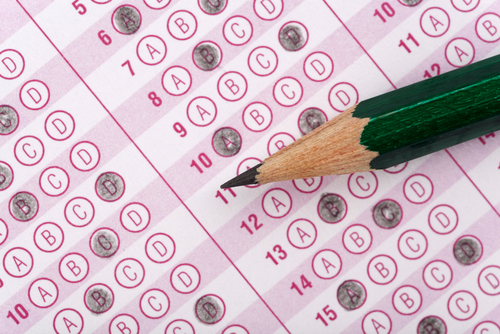Draft version of redesigned bar exam will be shared by NCBE soon

Image from Shutterstock.com.
With a target implementation year of 2026 for a redesigned bar exam, the National Conference of Bar Examiners expects to start pilot testing this year.
The NCBE announced plans in 2021 to redesign the bar exam, and potential changes were discussed Thursday at the Association of American Law Schools’ conference, which took place remotely.
Previously, the NCBE has said the redesigned bar exam will be delivered online and administered at test centers or jurisdiction-managed sites. Both options would have in-person proctors. The redesign follows various technological problems with remote bar exams in 2020 and 2021.
Much thought for the redesign has been put into what work that new lawyers do and how they do it, panelists told the audience. Findings from a national sample of new lawyers and their supervisors helped with the determination, and prototyping for the exam is happening now.
“We hope the exam might resemble the inbox of a new lawyer working through a series of client problems throughout the day,” said Deborah Jones Merritt, a member of the NCBE’s content scope committee and a recently retired law professor, who worked at the Ohio State University Moritz College of Law.
She also co-authored a 2020 study, Building a Better Bar: The 12 Building Blocks of Minimum Competence.
Multiple-choice questions will still be on the exam, but they will look different than the current version, according to panelists. The questions will no longer be restricted to four options and might include new types of selected response items.
Also, the Multistate Performance Test could have questions in which candidates complete certain sections of a pleading or a contract. And, consistent with the current MPT format, the NCBE is considering adding a section of a short-answer questions to be completed with provided case files and library materials.
There will likely not be the expectation that test-takers have rote knowledge of family law, estates and trusts, uniform commercial code and conflicts of law, said Judith Gundersen, president and CEO of the NCBE. Some questions could center on provided scenarios, with queries about those topics, but resource materials would be provided during the exam, she added. Additionally, some test content will require knowledge without source materials.
Whether the bar exam will remain a two-day test hasn’t been decided yet, partially because the NCBE has to determine what a reasonable amount of time would be to answer the new questions, said Danette McKinley, the NCBE’s director of diversity, fairness and inclusion research. Additionally, she said, the exam’s delivery method will be tested extensively before the 2026 release.
An audience member asked whether jurisdictions could use certain parts of the exam, rather than the entire test. Gundersen responded that the new exam won’t be as “amendable” as the current version.
“But we want to be of service to all jurisdictions,” she said, adding that jurisdictions have been asked to wait and see the redesigned exam before making any decisions. Also, the NCBE will assist jurisdictions with standards setting exercises, if asked.
According to Gundersen, the NCBE would like to find a way for jurisdictions to release bar exam results sooner.
“The question types will be different, and we hope this will allow jurisdictions to be able to grade faster,” the NCBE told the ABA Journal in an email.



